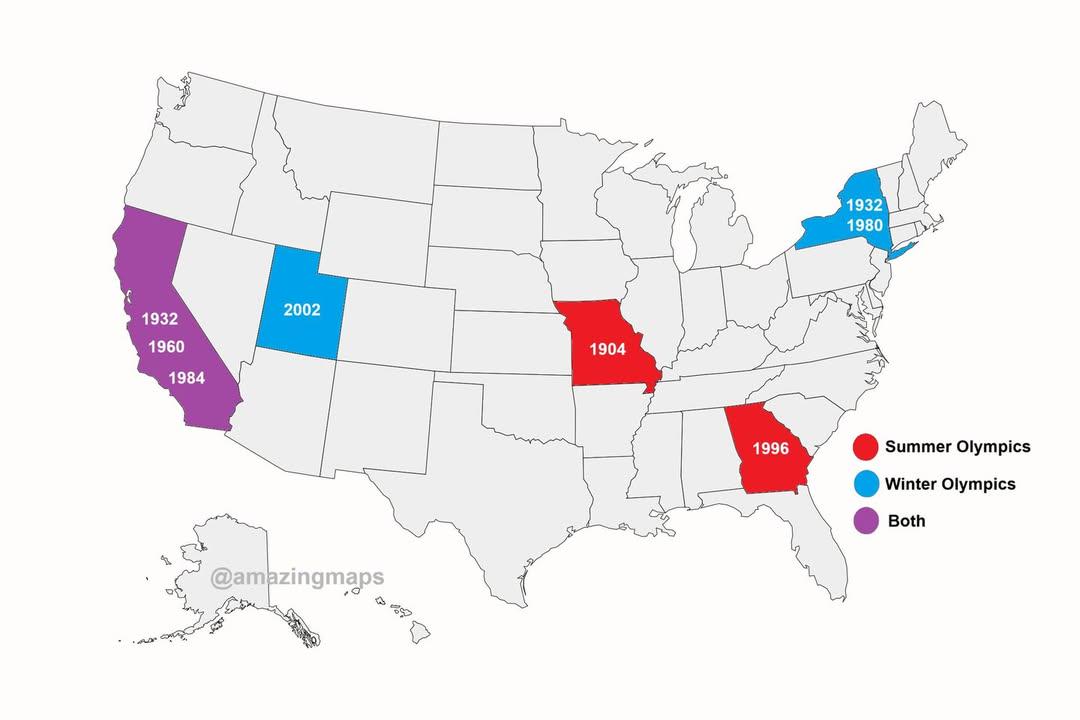U.S. States That Have Hosted the Olympics Map


Alex Cartwright
Senior Cartographer & GIS Specialist
Alex Cartwright is a renowned cartographer and geographic information systems specialist with over 15 years of experience in spatial analysis and data...
Geographic Analysis
What This Map Shows
This map illustrates the U.S. states that have hosted the Olympic Games throughout history, showcasing a fascinating aspect of American sports culture. The visualization makes it easy to see not just which states held the Summer and Winter Olympics, but also highlights the geographic distribution of these major international events. The Olympics, a global spectacle, have brought together athletes from around the world, and the locations where they were held tell a story of historical significance and cultural pride.
Deep Dive into Olympic Hosting in the U.S.
The United States has been a prominent player in the Olympic movement since the modern Olympics began in 1896. However, the U.S. has hosted the Summer and Winter Games multiple times, creating a rich tapestry of athletic history and regional pride. The first U.S.-hosted Olympics took place in St. Louis in 1904, coinciding with the World’s Fair, making it an event of both sporting and cultural significance.
Interestingly, the Summer Olympics have been held in several key cities: Los Angeles (1932, 1984, and set to host again in 2028), Atlanta (1996), and more recently, Salt Lake City (2002) for the Winter Games. Each of these cities has leveraged the Games to boost tourism, infrastructure, and international recognition. For example, the 1984 Los Angeles Olympics are often credited with turning a profit, which was a rare occurrence in Olympic history, paving the way for future cities to consider their economic impact more seriously.
The Winter Olympics, on the other hand, have been hosted in states like Utah and Colorado. The 2002 Winter Olympics in Salt Lake City were particularly notable not just for the athletic feats but also for the security measures taken post-9/11, which reshaped how large-scale events are managed.
The sheer scale of the Olympics also prompts discussions around urban development and the legacy of these events. Cities often invest heavily in infrastructure, building new facilities and upgrading transportation systems. However, this brings up questions about sustainability and the long-term benefits for the host cities. For instance, after the 1996 Atlanta Olympics, many venues faced underutilization, leading to debates about whether the economic boost was worth the investment.
Regional Analysis
Looking closely at the map, we can see that the majority of U.S. Olympic history is concentrated in specific regions. The West Coast, particularly California, stands out with Los Angeles hosting the Games multiple times. The South is represented by Atlanta, while the Northeast has seen Olympic action in cities like Lake Placid, New York, which hosted the Winter Olympics twice (1932 and 1980).
Interestingly, the Midwest has not hosted the Olympics, despite cities like Chicago making bids. Chicago’s bid for the 2016 Summer Olympics was a significant event, as it reflected the city's ambitions on the international stage, even though it ultimately lost to Rio de Janeiro.
In the West, the 2002 Winter Olympics in Salt Lake City brought significant attention to the region's winter sports facilities and tourism but also raised concerns about environmental impacts. The juxtaposition of the mountainous landscape with the Olympic legacy is a point of pride for many Utah residents.
Significance and Impact
The significance of hosting the Olympics extends beyond mere sports. It is a powerful tool for cities to showcase themselves on the global stage. The economic implications can be vast, influencing local economies through tourism and investment. However, it’s crucial to weigh these benefits against potential drawbacks such as displacement and infrastructure strain.
Moreover, the ongoing impact of climate change raises questions about the future of the Olympics, particularly for winter sports. As temperatures rise, the feasibility of hosting winter events in traditional locations becomes a pressing concern. The Olympics may need to adapt to new realities, possibly leading to more shared hosting arrangements between countries or the use of artificial snow in warmer climates.
In conclusion, this map serves as a reminder of the rich history of the Olympics in the United States, reflecting not only our athletic accomplishments but also the economic, cultural, and environmental narratives that accompany these monumental events. Have you ever wondered how the legacy of these games will evolve as the world changes? The conversation around the Olympics continues, urging us to think critically about the future of global sports.
Visualization Details
- Published
- August 11, 2025
- Views
- 114
Comments
Loading comments...